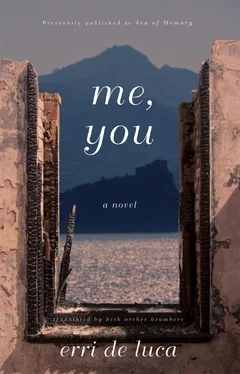“Today they’re just tourists, even if I can’t stand that language of theirs. I seem to hear again those shrieked commands and underneath those commands the order Feuer , fire. Who can forget them, those screams and shots? That’s why today when I meet Germans who are my age or older I avoid them. But I don’t hate them. Then, in Yugoslavia, I hated them, I wished for their death.”
I can’t avoid the Americans, but they’re not my enemies.
“You even have their blood in your veins,” Nicola added. “Your grandmother wouldn’t forgive you.”
It’s true, a quarter of my blood is American, but I never felt its presence. It got all dissolved in the Neapolitan cocktail.
“Nevertheless, you are part American,” he continued, “and you keep quiet like a foreigner, not like us. When we keep quiet one can tell from our face what we’re not saying. You keep quiet and one can tell you’re in another place, like me with that family in Sarajevo, God bless them wherever they are, that I never managed to call by name because it was too hard to say, like all the words in their language.”
One can see, Nicola, that I keep quiet in American.
During one of those afternoons a rare spectacle took place. The Andrea Doria , the transatlantic liner that made the crossing to America and had its home port in Naples, passed in front of the fishermen’s beach. In the narrow stretch of sea between the island and the Vivara shoal the gigantic prow appeared, cutting off the channel used by the ferryboats. The island was dumbstruck. Usually, the ship slid past in the open sea, and you saw her at a distance. But this time she changed course and entered the channel between the islands. I was the first to spot her and I asked Nicola, “What is she doing?” Nicola sprang to his feet, told me to carry the tackle to the house, and called out to the other fishermen. The fishermen’s beach was in an uproar, everybody dashing around. I did not understand what upset them so much. Those whose boats were anchored just beyond the beach raced out to board them and rowed out to deep water. Those whose boats were close to the beach called out to one another and helped one another drag them up on the sand as far back as possible. In the meantime, the ship approached the opening of the channel, the sea foaming white at the point of her keel. From the port, the harbor police sounded the siren in salute and the ship replied with the bellow of a monster. She crossed the channel and everything looked tiny compared with her height, even the castle. Her smokestack alone was the size of a palace. The boats that had managed to reach open water took the first waves. We saw them bounce on the huge crests and the fishermen turned into rodeo riders mounted on a beast that kicked its rump as high as the sky. Hit sideways, they would have been overturned. That was what I had not understood: the waves. They flung themselves against the beach with hurricane force, lifting the few boats still at anchor and hurling them at the shore, and on the beach the foam oozed all the way up to the houses. It was an onslaught of six enormous waves followed by a few smaller ones. The noise on the beach covered the last welcoming blasts of the sirens.
The fishermen were still calling out and helping one another. I had never seen so marvelous and so terrifying a mechanism at such close range. The waves reached the boats that had been beached and pulled two of them out to sea. Fortunately they did not collide with those that had been thrown against the shore and no damage was done. For the rest of the afternoon the fishermen worked together to clean up the mess, each helping the others. I helped too. Nicola thanked me for having noticed in time, because even a minute’s delay could have wreaked havoc. When the other fishermen came to thank Nicola, he pointed to me and they wanted to offer me a glass of rosolio, a sweet wine.
I was appalled by the thought that this stupendous spectacle could be so dangerous to people whose livelihood was fishing. It had already happened before. Every so often, a transatlantic liner slid into the channel to provide the passengers on board with a view of the island, and created a five-minute storm with her waves, big enough to sink all the boats.
The fishermen weren’t angry. A big ship also belonged to the sea, to the whirlwinds, to the storms, to all the fury of nature against which man pitted himself. You could see their patience from their mouths. After the waves and the work of putting the beach back in order, they stood around smoking their pipes, smiling over the success of their defenses.
Daniele’s friends had been on the beach when they caught sight of the Andrea Doria and they swam out to the motorboat that belonged to one of them in order to meet the ship. They had run the risk of capsizing on the waves, but then they rode on the carpet of the wake, following the ship for a while. Under the stern they experienced a reverse vertigo, as if they were clinging to the edge of an abyss. These impressions were Caia’s, always disposed as she was to visions and seeing things upside down. The thundering propeller made the sea boil in front of them and the ship’s answering horn sounded to her like the holy day ram’s horn of her childhood.
It was that same evening, after the ship’s appearance, that we met by chance for the first time since her anger on the terrace over her name. She was heading for the beach, to the house where she was a guest. I was coming up from the fishermen’s beach, covered with sand, oil, and grease like the boats after the near catastrophe. I saw her approaching and when she noticed me she ran up to me gaily, her curls bouncing in the air and her sandals sliding on the smooth road. She excitedly related the whole adventure, the thrills and the screams on the rearing motorboat, the disappointment when the waves subsided, the wonder of that white tabletop of flat sea produced by the immensity of the stern, and all the rest up to the ram’s horn. She stopped at that reference to her childhood, which at the time I could not understand — the sound of the shofar in the synagogue on the occasion of Yom Kippur. I was unfamiliar with those holidays. She stopped, as she had in the middle of the dance floor, surely remembering her outburst and abrupt departure, but this time she looked at me differently, like a little girl at an old man. Even her voice lost its secure, enveloping tone and was replaced by a childlike trill. She saw how dirty I was, and reproached me for not making better use of my vacation, for spending too much time on fishing. I didn’t want to tell her about the upheaval on the fishermen’s beach and spoil her pleasure by injecting an afterthought of fear. I nodded my agreement. Yes, I knew how messy I looked to her. I cleared my throat, gestured with my palms up to indicate the condition of my clothing, and said in a strange deep voice, “I’m sorry.”
In a near whisper, almost without opening her lips, she said, “Let me hear my name again.”
I looked at her, not at her eyes but a little higher, at the edge of her hairline where her thick chocolate strands lay flat and where I would have liked to plant a kiss.
“Chaiele,” I said in a voice not my own.
“Again.”
“Chaiele.”
She closed her eyes, squeezing them hard, then opened them wide and said, “Try to make the l soft, let it melt in your mouth like candy,” and she pronounced it for me. I repeated it. “That’s how I was called, the way you said it now. I don’t want to know how you found out. I don’t want to tell you anything. You are not to say that name in front of the others. For them I am Caia. Only for you am I Chaiele. Do you understand?”
This time I closed my eyes and no longer saw that place on her forehead. I answered yes, in that strange deep voice that came from the bottom of my throat, the bass tones of a guitar. She kissed my cheek while my eyes were still closed.
Читать дальше












